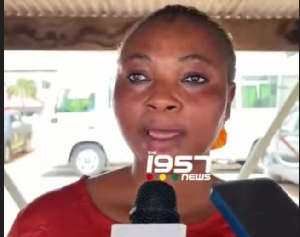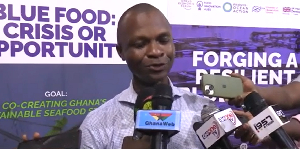By Kwame Okoampa-Ahoofe, Jr., Ph.D.
When the parliamentarian daughter of Ghana’s first president talks about the abysmal failure of leadership among the ranks of those who would have the mythical title of Nkrumah’s avatar bestowed on them, it is not quite clear precisely what Ms. Samia Nkrumah is talking about, since her own father never remarkably advanced beyond the theatrical rudiments of tutelage afforded him by Dr. J, B. Danquah, the putative Doyen of Gold Coast and modern Ghanaian politics (See “Samia Nkrumah: CPP Leaders Have Failed” Ghanaweb.com 12/1/10).
Needless to say, those of us who are well-versed in the organizational history of the so-called Convention People’s Party (CPP) are quite well aware that but for the indefatigable likes of Messrs. Komla Agbeli Gbedemah, Kojo Botsio and Krobo Edusei, to name just a handful, the CPP would have ended up as just another nine-day wonder.
For starters, Nkrumah’s very decision to part ways with the Danquah-Grant-led United Gold Coast Convention (UGCC), once he espied a heady opportunity to actualize his fast-creeping megalomania, you may choose to call it “The Vision Thing,” was instigated by these trio and a few others, almost all of whom had been mentored by Dr. Danquah. And while, indeed, he had ridden to a landslide victory in the 1951 election, for example, it is also significant to observe that the bulk of the proverbial heavy-lifting that went into the actual campaigning largely fell on the shoulders of Komla Gbedemah (with the Show Boy being in prison for seditious activities), although the latter would eventually be pushed out of Nkrumah’s inner-circle even as the CPP Life-Chairman began to heavily surround himself with “littoral homeboys” like Botsio, Welbeck, Baako, Armah and the Omanhene of one of the Assin states (I cannot readily remember which) who would become head of the Tema Township Development Corporation; as well as Nana Kobena Nketsia and Nzema “homeboy confidants” like Messrs. Yaw Djin, Ambrose Yankey and Aryeh-Kumi.
What is most fascinating about the man and a signal behavioral aspect that is routinely and conveniently overlooked by his disciples and partisans, is Nkrumah’s seemingly congenital inability to comfortably share power. Thus, for instance, other than Chairman Jeremiah John Rawlinsg in his AFRC-PNDC phase, Ghana’s first president had no constitutionally elected vice-president or even a prime minister. And, in fact, reliable legend has it that anytime that Mr. Nkrumah was about to travel outside the country, he mischievously established a three-man “Presidential Council” to theoretically take charge of affairs. In sum, Nkrumah epitomized the personality of a man who felt pathologically insecure in his shoes, as it were. The deftly orchestrated effect of his bogus “Presidential Council” was that in his absence, pressing national activities/projects ground to a virtual standstill. Thus this strategic deployment of divide-and-conquer gimmickry also ensured that a lot of back-biting would ensue among the deputizing “co-presidents”, thereby falsely differentiating the leadership stature of the “Osagyefo” by throwing it into sharp relief. The fact of the matter is that none of the key players in either THE PARTY or the Government were allowed to fully exercise their leadership skills, responsibilities and genius, obviously out of fear of upstaging THE LEADER, a clearly extroverted figure more interested in using Ghana as a strategic beachhead for his pan-Africanist ambitions than the focused and sustained development of the electorate and the country that had thus advantageously positioned him.
Nkrumah also, like his comparatively closest successor – (at least in the hallucinatory imagination of Mr. Victor Gbeho) – and sometime bitter critic, Mr. Rawlings, at least in the latter’s PNDC days, did not have a fixed salary. And to be certain, even to this day, nobody knows exactly how much the Show Boy carried home in his briefcase each pay period. What is well known, however, is that Nkroful Kwame liked to splurge, both at the individual/private and international/public levels. And any careful reader who has bothered to peruse his autobiography has not been spared such hints of “booty” generosity. “Booty generosity” because Nkrumah bizarrely thought in being voted Ghana’s first premier, he had also been bequeathed a personal inheritance!
Then also, the very title of his autobiography ought to have readily informed his most sensitive readers at the time how Nkrumah intended to rule over the new fiefdom ceded him by Britain. It was rather presumptuously titled Ghana: The Autobiography of Kwame Nkrumah. Some of his fanatic disciples envisage the preceding in terms of the author’s supposedly unrivaled sense of patriotism. Quite interestingly and, in retrospect, paradoxically, the Doyen of modern Ghanaian politics saw matters quite differently. And such matters, to be certain, bespoke of the at once eerie and sinister. He would prophetically remark on how like an eighteenth-century French monarch, the “now-Honorary Doctor” Kwame Nkrumah found it almost impossible to differentiate his individual identity from that of the newly “emancipated” nation which he ruled. “What State of Ghana are you talking about?” the Doyen both quipped and riposted, “The State Is Me!” In spite of all the exaggerated talk about Nkrumah’s phenomenal achievements, by the eve of his overthrow, as I have also noted elsewhere, an observation that is based on both personal experience and scholarship, not many Ghanaians were anymore fond of their “Messiah,” as the Show Boy preferred to be known. And so when she gushes nostalgically about assuming the chairmanship of the rump-Red-Cockerel party, with the aim of wresting reins of governance from the Nkrumah-leaning National Democratic Congress, at least on the watch of President John Evans Atta-Mills, it is not clear precisely how Ms. Samia Nkrumah expects the Ghanaian electorate to react or respond, particularly in view of our excruciatingly painful memories about how her own father rode roughshod over democratic culture and the civilized rule of law by converting both his Flagstaff House and Independence Square offices into a one-man legislative assembly, even as the CPP-dominated National Assembly was effectively reduced to a legislative rubber-stamp.
Fortunately, Ghanaians seem to have become too smart for such tawdry and opportunistic gimmickry. And they have not hesitated to demonstrate the same by ensuring that the rump-CPP would continue to fast recede into the proverbial sunset. In her Jomoro Constituency, Nkrumah may seem to still rule the roost, at least based on the 2008 election results and also what many of the constituents themselves may faintly remember about the man. In the rest of the country, however, it is refreshingly a new day altogether. In sum, and in the words of Ms. Samia Nkrumah, the rump-CPP leaders have woefully failed to revive a long-dead and gone horse whom they continue to madly flog into mince-meat in the village square.
*Kwame Okoampa-Ahoofe, Jr., Ph.D., is Associate Professor of English, Journalism and Creative Writing at Nassau Community College of the State University of New York, Garden City. He is a Governing Board Member of the Accra-based Danquah Institute (DI) and the author of a forthcoming volume of poetry titled “The Obama Serenades.” E-mail: okoampaahoofe@optimum.net. ###
Opinions of Monday, 17 January 2011
Columnist: Okoampa-Ahoofe, Kwame
Flogging a Dead Horse
Entertainment













